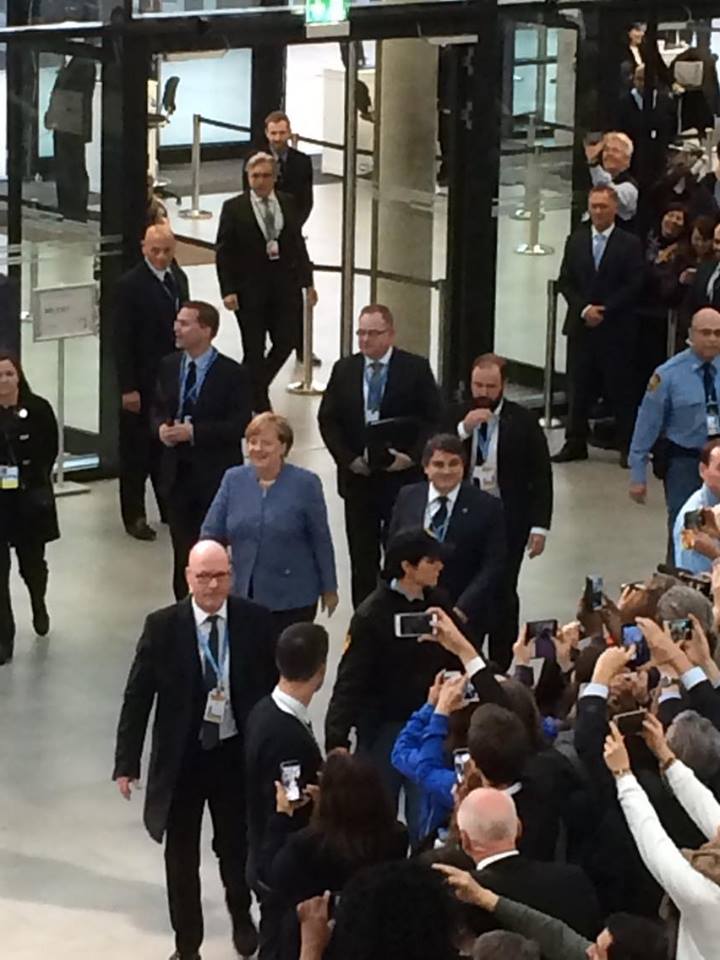Bonn, 15 Nov (TWN)- With three days left for the climate talks to conclude in Bonn, Germany, Parties are hard at work to iron out the remaining differences, as Heads of States and Government have arrived for the high-level segment which opened afternoon of Wednesday, 15 Nov.The opening of the high-level segment of the climate talks is expected to be attended by approximately 25 Heads of State or Government and will be presided over by Fijian Prime Minister, Frank Bainimarama, who is President of the meeting of Parties to the UNFCCC, Kyoto Protocol and the Paris Agreement.
It will also be attended by Frank-Walter Steinmeier, President of the Federal Republic of Germany, António Guterres, the Secretary-General of the United Nations, Miroslav Laj?ák, President of the UN General Assembly and Patricia Espinosa, UNFCCC Executive Secretary. The high-level segment will see nearly 175 statements being delivered by Heads of State and Government as well as Ministers.
Unlike other climate talks of the past where the last remaining days are usually mired in frenzy, there is an unusual and relative calm in the conference centre with what appears to be the resolution of some major sticky issues, except in relation to finance related matters.
Delegates dealing with the issues on finance matters under the 23rd meeting of the Conference of Parties to the Convention (COP 23) and the Subsidiary Body for Implementation (SBI) are in deep discussion to resolve outstanding differences, which could go on till the final hours of the talks.
The subsidiary bodies of the UNFCCC, the Subsidiary Body for Scientific and Technological Advice (SBSTA) and the Subsidiary Body for Implementation (SBI), held the first part of their closing plenaries on Tuesday, with the next part concluding on Wednesday. (See below for more details.)
The Ad Hoc Working Group on the Paris Agreement (APA) also convened a contact group meeting on 14 Nov. to discuss the draft conclusions to be adopted. (See details below.)
Possible decision on pre-2020 actions
Sources revealed that a decision could be reached on addressing pre-2020 issues, as informal consultations on the matter continued the late evening of 14 Nov. (See TWN Updates 2, 7, 10 on the issue.) The Like-minded Developing Countries (LMDC) with the support of the G77 and China, has been pushing for an agenda item to address pre-2020 issues that relates to the implementation of previous decisions taken to accelerate and increase mitigation ambition.
According to sources, after the informal consultations held last week, the COP22 Presidency (who conducted the consultations on behalf of the COP23 Presidency) held bilateral meetings with several individual Parties to arrive at a way ahead. Sources revealed that Parties may have arrived at a compromise on the way ahead.
The compromise may involve a decision calling for submissions by Parties by the May session of climate talks in 2018 on how Parties have responded to the decision taken in Warsaw in implementing their commitments under paras 3 and 4 of decision 1/CP.19. Sources say the compromise may also involve requesting the UNFCCC secretariat to prepare a synthesis report based on the submissions of Parties, which will provide inputs to a stocktake to be held next year.
In addition, the 2018 facilitative dialogue is also expected to address pre-2020 actions, apart from looking at the nationally determined contributions (NDCs) of Parties under the Paris Agreement.
It seems that the will also be a letter from the COP 23 Presidency and the UNFCCC Executive Secretary to urge Parties to the Kyoto Protocol to ratify the Doha Amendment to the Protocol to give effect to the second commitment period.
The COP22 Presidency is expected to convene another informal consultation on 15 Nov to discuss the compromise proposal and if there are no further objections, this will be captured in a COP decision.
Deadlock over finance issues
A number of financial issues, however, remained deadlocked. These include a review of the functions of the Standing Committee on Finance (under the SBI); long-term finance (under the COP); and the Green Climate Fund (GCF).
On the review of the functions of the SCF, the draft conclusions presented to Parties were not accepted as key proposals of developing countries were missing from the draft conclusions, especially in relation to text on alternate member arrangements for the SCF.
Developing countries had put forth a proposal to include alternate members to attend the SCF meetings but this proposal was objected by developed countries.
Also at issue was whether the SCF should continue providing guidance to the operating entities of the Financial Mechanism of the Convention (the GCF and the Global Environment Facility [GEF]). While developing countries were in favour of the SCF continuing to provide guidance to the GCF and GEF, developed countries were against continuing with the practice.
Another contentious issue was in relation to the frequency of forums organized by the SCF. While the developing countries wanted to continue with the existing practice of conducting forums annually, developed countries wanted to discontinue the practice and wanted the forums to be held bi-annually.
Since there was no consensus, the draft conclusions, with bracketed paragraphs, were forwarded to the SBI Chair for his further consideration.
During the discussions on long-term finance on 14 Nov, co-facilitator Zaheer Fakir (South Africa) presented a draft decision text to Parties. However, both developing and developed countries expressed concerns over key issues with respect to the draft decision. Developing countries wanted a paragraph deleted in relation to the multilateral development banks.
The paragraph proposed was as follows:
‘Acknowledges the steps taken by Parties and multilateral development banks in developing methodologies on reporting climate finance and their increased efforts to mobilize climate finance, and encourages multilateral development banks to enhance their cooperation in scaling up climate finance and improving their methodologies on reporting climate finance’.
Besides this, developing countries wanted the key messages from the 2017 in-session long-term finance workshop captured in the draft decision. They also wanted language in assisting developing countries in assessing their NDC-related needs and priorities included in the draft decision.
Developed countries, on the other hand, wanted language recognizing the progress they have made towards the 2020 goal of USD 100 billion included in the draft decision.
There were other disagreements on a host of other issues such as financing for adaptation, developed countries enhancing information about the USD 100 billion pathway, and the timing of the compilation and synthesis of developed countries’ biennial submissions.
Another version of the draft decision is likely to be issued and Parties are expected to continue consultations on long-term finance.
Ad Hoc Working Group on the Paris Agreement
The Ad Hoc Working Group on Paris Agreement (APA) is set to convene its closing plenary on 15 Nov, following the convening of a contact group meeting on 14 Nov, where Co-Chairs Sara Baashan (Saudi Arabia) and Jo Tyndall (New Zealand) presented draft conclusions of the session to Parties for their consideration.
Informal consultations on the various agenda items of the APA have resulted in the production of informal notes, which capture Parties’ views and is expected to be the material used for further negotiations next year.
At the during the contact group that Parties wanted the informal notes by the co-facilitators to be annexed to the draft conclusions.
According to the draft conclusions presented during the contact group, a few contentious issues emerged in the areas of whether there should be a call for submissions on how to advance work on substantive issues in order for the APA to complete its work by Dec 2018; whether the Secretariat should prepare technical papers and synthesize the substantive content of the submissions; and whether there should be an additional session in 2018.
There was no consensus on any of these areas. Following the discussions, the Co-Chairs presented a revised iteration of the draft conclusions, which was posted on the UNFCCC website at 9 p.m on 14 Nov.
According to the draft conclusions, the call for submissions on substantive issues was replaced with a “general call for submissions by Parties,” while noting that focused “textual proposals would be most helpful in allowing Parties to focus on substance in their deliberations on the APA agenda items”.
The reference to the Secretariat synthesizing submissions has been deleted.
On the additional meeting, the revised draft conclusions reflected that given the considerable amount of work required to fulfill its mandate by COP24, “the APA expressed its view that additional negotiating time in 2018 may be useful, depending on the progress being made and the feasibility of convening an additional session in a cost-effective manner while also allowing effective participation of experts from developing countries”.
The revised draft conclusions are expected to be further discussed and adopted at the closing plenary of the APA, which is scheduled at 11 am on 15 Nov.
Subsidiary Bodies
The first part of the closing plenary of the 47th session of the SBI (SBI47) and the SBSTA (SBSTA47) was held late afternoon on 14 Nov.
The SBI adopted a number of draft conclusions. Some of the key draft conclusions adopted included: common timeframes for NDCs referred to in Article 4.10 of the Paris Agreement; development of modalities and procedures for the operation and use of a public registry referred to in Article 4.12 of the PA, development of modalities and procedures for the operation and use of a public registry referred to in Article 7.12 of the PA, the third review of the Adaptation Fund, and gender and climate change.
The conclusions adopted on gender and climate change was also seen as important as it resulted in a gender action plan.
The SBSTA also adopted a number of draft conclusions. Some of the key draft conclusions adopted included: the technology framework under Article 4.10 of the PA, agriculture, and modalities for the accounting of financial resources provided and mobilized through public interventions in accordance with Article 9.7 of the PA.
The conclusions adopted on agriculture was viewed as significant as developed countries had shown resistance on the matter.
Following the conclusion of the first part of the SBI and SBSTA closing plenary, a joint meeting of SBI47 and SBSTA47 was conducted to take groups’, Parties and civil societies’ statements.
The second part of the closing plenary of SBI and SBSTA will cover the remaining agenda items during the morning of 15 November.




